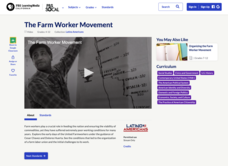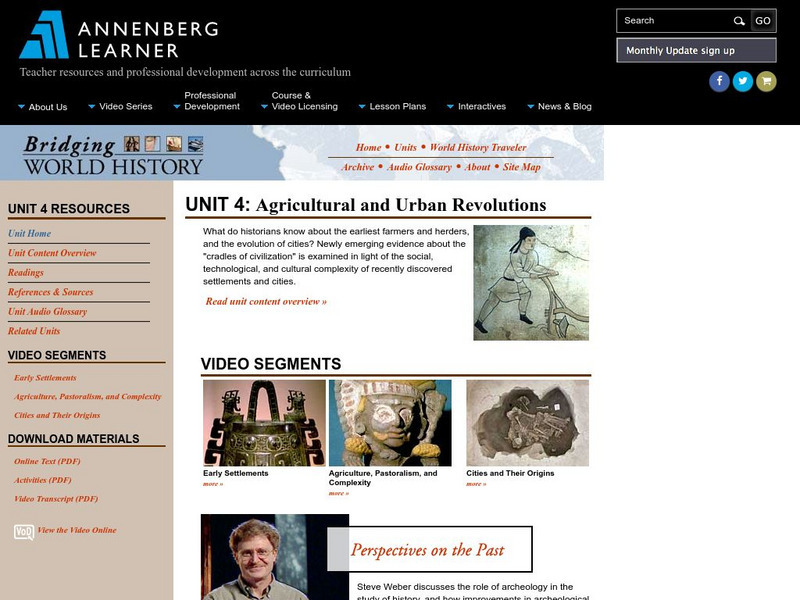PBS
When Ants Domesticated Fungi
While we’ve been farming for around 10,000 to 12,000 years, the ancestors of ants have been doing it for around 60 million years. So when, and how, and why did ants start … farming?
Crash Course
Commerce, Agriculture, and Slavery: Crash Course European History
We've been talking a lot about kings, and queens, and wars, and religious upheaval for most of this series, but let's take a moment to zoom out, and look at the ways that individuals' lives were changing in the time span we've covered so...
Crash Course
Why is There Uneven Access to Food? Crash Course Geography
Food insecurity, or the lack of access to enough nutritious food, is a complex problem. In the 21st century, even with all of our advances in technology, access to food is still uneven. Today we're going to look at the diffusion of food...
Curated Video
The Agricultural Revolution: Crash Course World History
In which John Green investigates the dawn of human civilization. John looks into how people gave up hunting and gathering to become agriculturalists, and how that change has influenced the world we live in today. Also, there are some...
TED Talks
TED: Nationalism vs. globalism: the new political divide | Yuval Noah Harari
How do we make sense of today's political divisions? In a wide-ranging conversation full of insight, historian Yuval Harari places our current turmoil in a broader context, against the ongoing disruption of our technology, climate, media...
TED-Ed
TED-Ed: Can we create the "perfect" farm? | Brent Loken
About 10,000 years ago, humans began to farm. This agricultural revolution was a turning point in our history and enabled the existence of civilization. Today, nearly 40 percent of our planet is farmland. Spread all over the world, these...
Crash Course
The Agricultural Revolution Crash Course World History
In which John Green investigates the dawn of human civilization. John looks into how people gave up hunting and gathering to become agriculturalists, and how that change has influenced the world we live in today. Also, there are some...
Crash Course
Population, Sustainability, and Malthus: Crash Course World History 215
In which John Green teaches you about population. So, how many people can reasonably live on the Earth? Thomas Malthus got it totally wrong in the 19th century, but for some reason, he keeps coming up when we talk about population. In...
Vlogbrothers
Why Cities?
In which John discusses the agricultural revolution, the development of permanent settlements, and whether cities were good news. The book discussed in "The Case against Civilization" is called AGAINST THE GRAIN, and while I disagree...
FuseSchool
BIOLOGY - Environment - Global population growth
From about 2 million years ago until 13,000 years ago there were several human species inhabiting the earth. In fact, 100,000 years ago there were at least 6 different human species! Today there’s just us: Homo sapiens. In this video...
Crash Course
Why Early Globalization Matters: Crash Course Big History #206
What do potatoes, printing, and plague have to do with the global distribution of humans? An informative video explores globalization from the earliest migration of humans to today with a focus on these three common elements that prompt...
Crash Course
Migrations and Intensification: Crash Course Big History #7
What happens when the earth reaches its carrying capacity of humans? As human populations grow, societies change from hunters and gatherers to agriculture to the industrial age and beyond. A video takes a global perspective of migration...
PBS
The Farm Worker Movement
An impactful video details the work of Cesar Chavez and Dolores Huerta in creating the United Farmworkers. In the 1960s farm workers of California stood together to better their working conditions. Making their way to Sacramento,...
American Chemical Society
Vertical Farming
Create a vegetation high rise! Scholars study the trend of vertical farming and the requirements needed for a successful crop. The lesson from the ACS Reactions series explores the advantages and disadvantages in relation to traditional...
Veritasium
Inside the Svalbard Seed Vault
One of the most important deposits humankind can make isn't money. Explore the depths of the Svalbard Seed Vault using a video from the Veritasium playlist. The narrator and his guide examine the sealed cartons of seeds from nations...
Crash Course
Human Evolution: Crash Course Big History #6
Humans did not evolve from monkeys or chimpanzees—so what does our evolution look like? A video explains the evolution of humans from a common ancestor to homo sapiens. It describes the many branches on our family tree as well as the...
MinuteEarth
The Great North American Locust Plague
The largest locust swarm recorded in North America measured 110 miles wide and 1,800 miles long, making it roughly twice the size of Colorado. A video begins with what locusts are and where they came from then explains the damage they...
Khan Academy
The Agricultural Revolution
Rather than simply define the agricultural revolution, invite your learners to consider the advantages and disadvantages that agriculture has brought to humanity as a whole. John Green begins this first episode of this series by...
TED-Ed
How Farming Planted the Seeds for the Internet
Is farming the greatest innovation in all of history? Watch as modern technology and advancements are traced back to the invention of farming in the Neolithic Revolution. The video illustrates how agricultural surplus led to division of...
Annenberg Foundation
Annenberg Learner: Bridging World History: Agriculture and Urban Revolutions
Through archaeological research, this unit consists of the history of agriculture leading to the urban development of early humans as they slowed their transitional foraging to settling into a specific area.
Tom Richey
Tom Richey: British Agricultural Revolution & Enclosure Movement (Ap Euro)
AP European History video in which Mr. Richey describes the revolution in agricultural science, technology and innovation leading to burgeoning population in Great Britain, 16th through 18th Centuries. [13:10]
History of Our World
Podcast History of Our World: 5 Neolithic Revolution
Rob Monaco's podcast [18:42] talks about the Neolithic, or New Stone Age period, in which hunter-gatherer society gave way to agriculture or farming allowing for greater numbers of people and civilizations to flourish.
Khan Academy
Khan Academy: Tree of Life: Agriculture Rocks Our World
A video showing how change in the Earth's climate 14,000 years ago led to the development of agriculture. Learn how this development provided more food to feed a larger population, changed the social structure of communities, led to the...













